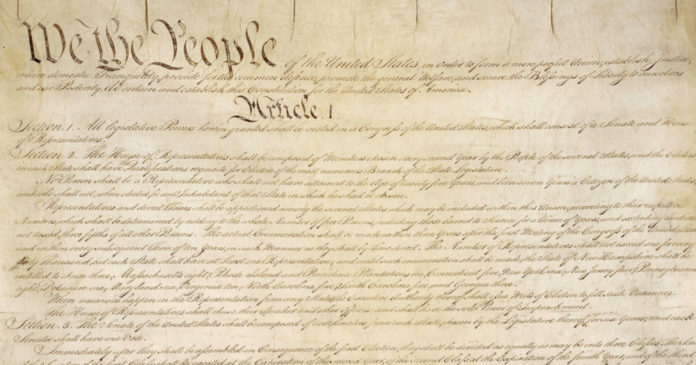
This rebroadcast originally aired on May 17, 2021.
What do Americans have in common? Scholar Akhil Reed Amar says the one thing every single American shares is the United States Constitution. He shares why he wants Americans to better understand the words that made us.
Guests
Akhil Reed Amar, professor of law and political science at Yale University. Author of “The Words That Made Us.”
Interview Highlights
Do you think members of the Republican Party are at war with the United States Constitution?
Akhil Reed Amar: “I personally think they’re at war with the truth, and that’s an even bigger thing to be at war with. And yes, I also think they’re at war with the Constitution because here are the two most fundamental elements of the American constitution, or maybe three. The Constitution has to endure. It has to go on. In order for that to happen there have to be fair elections whose results are abided by all concerned, even the losers, and open, robust free speech.
“… Jefferson and Madison formed a political party that deformed their conduct. They originally began as antislavery folks and then they became increasingly pro-slavery because that’s where the party base was. Why did they form their political party? In part because John Adams and his supporters, who themselves were a kind of a party, made it a crime to criticize John Adams. So you can’t have a world where one party tries to criminalize the other party, which John Adams did, which Donald Trump threatened to do, even before he was elected with chants of ‘Lock Her Up.’
“So you have to have free speech. You have to have fair elections. And the two go together, because you can’t have fair elections without free speech. And then you have to have people accepting the legitimacy of the verdict. And at the end of the day, John Adams did leave office, although he didn’t show up for the inauguration.
“And there are echoes actually in 1800, 1801 of what happened in the most recent election. The story I tell in the book is actually the transition in 1800, 1801 from one political party to another wasn’t quite as tame and peaceful as people remember it as being. … The system [actually] came closer to melting down than most people understand today. But you have to have fair elections, and people have to abide by the results of those elections. And when they don’t, it’s called a civil war.”
You call 1788 a pivotal year, not just in the history of this continent, but for humanity more broadly. And why is that?
Akhil Reed Amar: “Yes, it’s the hinge of human history. It’s the year that changed everything. And here’s why. There’s so many things we take for granted, like democracy, self-government. Well, before the American Revolution, almost no one ever in the history of the world was part of a self-governing society. Most of the people in the planet for most years in most places were basically governed by force or at best custom.
“They were governed by kings, emperors, czars, sultans, Mughal lords, tribal chiefs, mainly thugs who had military power, who had bigger clubs, later guns … or maybe priests who just claimed to rule because they claimed a pipeline to God. So princes and priests ruled the world almost everywhere, almost all of us. Yes, there were a few tiny Greek city states that 500 years before Christ managed to have democracy on a very small scale. Athens, most famously in the Periclean age … but they collapsed. And yes, Rome, before it became an empire, was a republic actually for a couple hundred years. But it collapsed.
“And when the American Revolution breaks out, the only people in the world who even come close to governing themselves are the Brits who have a king that no one voted for, and a House of Lords that no one voted for, and a big established church. And the Swiss, who are a bunch of sheepherder’s and there are probably more sheep than people. And so it’s not a very big society. And then in 1776, there’s a revolution. But that Declaration of Independence isn’t put to a vote. And none of the state constitutions that emerge in 1776 is put to a vote. And the Articles of Confederation, which is the first version of USA 1.0, like the modern EU today, European Union or NATO, isn’t put to a vote.
“But in 1788, the hinge of human history, we, the people of the United States, up and down a continent, put this proposal to a vote. And no one had ever done that before in world history. Not the Greeks, not the Romans, not the Brits, not the Swiss. No one had ever done that. And the world would never be the same, because the world that you and I inhabit today is a world in which democracy reigns over half the planet. When my parents are born, there’s no democracy in India. It’s an imperfect democracy there. But there is one today in a way that there wasn’t when my parents were born and they’re still alive.
“And all of Eastern Europe has self-government in a way that it didn’t before, and Central Europe and Western Europe. At the time of the Constitution, France is an absolutist tyranny, and now it’s an impressive [republic]. … And I claim that is because of the hinge of human history, the year 1788, where, to borrow a phrase, we the people the United States did in actual fact ordain and establish a constitution by putting it to a vote and by allowing there to be a massive conversation, pro and con, that opposed this proposal. And you weren’t going to be basically exiled or banished. You were going to be listened to. And some of your big ideas would become the Bill of Rights and some of your big leaders would eventually become presidents, and vice presidents and justices.”
If you were to write a new supreme governing document for the U.S. today, is the Constitution what you would write?
Akhil Reed Amar: “I wouldn’t want to write it for America top down. I would need ordinary Americans to buy into it. That’s the most important thing that I would try. And I mentioned before that ancient societies like Athens were democratic, but precisely they gave the power to write the Constitution to one man. They called him the lawgiver, so on. And he handed the law down from on high. I wouldn’t want to do that. I don’t think one person, no matter who that person is, is going to be smarter than all of us together. The wisdom of crowds.
“And today, we’ve been conditioned by the Constitution. It shapes how we think. And you can’t kind of ignore that, just like you can’t ignore like where the Mississippi River is or the Rocky Mountains are. So I think what I would modify your hypothetical just a little bit to say what amendments, given we already have a status quo. You know, we’re not just floating somewhere in someone’s imagination. Given we already have the status quo, what things would I, you know, love to persuade my fellow citizens we might want to modify?
“I would say the biggest thing that I don’t love … I think actually direct election of the president would be a good thing. But here’s why I think so. It’s how we pick every governor, one person, one vote. I look to actually what Americans actually do. I want ERA. Why do I want it? Because state constitutions have ERA. And so I would want someone who was not lucky enough, like you and me, to be born in the United States, if they come here legally and they play by the rules to be eligible to be president in 35 years. And we allow them to be governors. Arnold Schwarzenegger, Jennifer Granholm. So I often look to state experiences, which are American democracy in action, to try to think about how the federal might be better.”
Would you argue that it’s too hard to make modernizing changes to the Constitution?
Akhil Reed Amar: “I used to think that and I’ve changed my mind. … I didn’t mention the biggest one. But I would like the federal constitution to look more like the states. So ERA eligibility of naturalized citizens to be chief executive, just like you can be governor in Michigan or California if you’re a naturalized citizen. Direct election, just like we pick governors by direct election in states.
“And I think the Senate is malapportioned. And then our state upper houses are malapportioned that way. So those would be my big four. And I look at state constitutions as my template. I used to think, now state constitutions are easy to amend, and the federal constitution is harder to amend. And I used to think, Oh, the federal constitution should be easy to amend, just like states. I’ve changed my mind for two reasons.
“One, states have had a lot of bad amendments as well as good ones. I’m from California and some of the amendments have been good, and some of them are bad. Almost all the federal amendments have been good. They’ve added to liberty and equality, Bill of Rights, ending slavery, women’s suffrage, get rid of poll tax disfranchisement. Second and related point is, if you ask most Americans which constitution they have more loyalty to, I think they would actually say the federal over the states. So when I’m a young person, I say, Oh, things could be so much better. Constitutions, too hard to amend. They’ve got all these brilliant ideas and they’re never going to get through.
“Now I’m an old guy and I think, Oh constitution could be so much worse. The states, all sorts of bad ideas are happening. If the Constitution were easily amendable today, maybe it’d be better, but maybe it actually take us in the wrong direction. In my lifetime, amendments were proposed to make marriage only one man and one woman, George W. Bush proposed such a thing. And it had majorities, but not super majorities to actually succeed, or there was an amendment proposed to make flag burning a crime.
“I think that’s a mistake because it cuts into free speech and that’s a bad thing. So I’ve changed my mind on that. And on ERA, I’m in favor emphatically. I think we should do it today. Let’s you and I agree today that we’re going to try to, you know, get people to be motivated. Truth be told, it won’t make that much of a difference in what courts do, because courts have properly construed the 14th Amendment to provide for women’s equality, and gay equality as well as racial equality. But I’d rather have it explicit in the Constitution.”
From The Reading List
The Atlantic: “The Year That Changed Everything” — “In 1788, We the People of the United States ordained a Constitution to ‘secure the blessings of liberty to ourselves and our posterity.’ It was the year that changed everything. Yet for the past century, posterity has profoundly misunderstood what happened then—who did what, why they did it, and how, and also what they failed to do that needed doing.”
New York Times: “The Constitution Is More Than a Document — It’s a Conversation” — “When I was part of a legal team trying to establish that Alabama children in poor school districts had a right to equal educational funding under the state Constitution, we found an unexpected obstacle in our way.”








